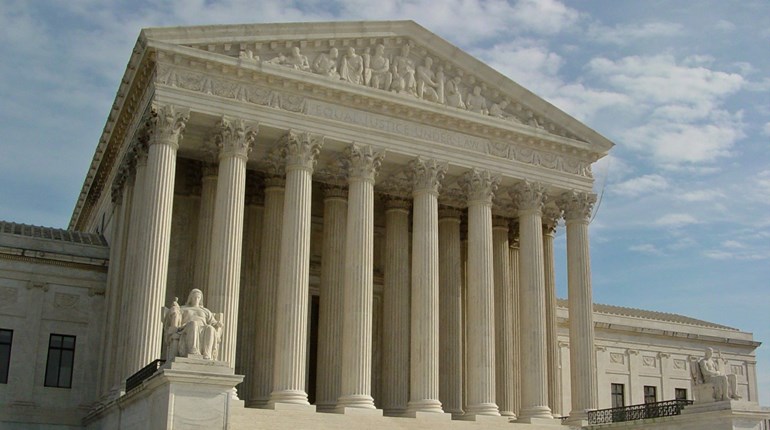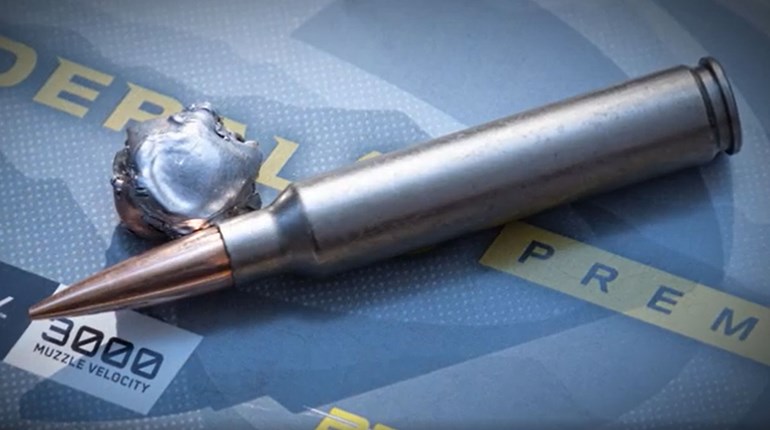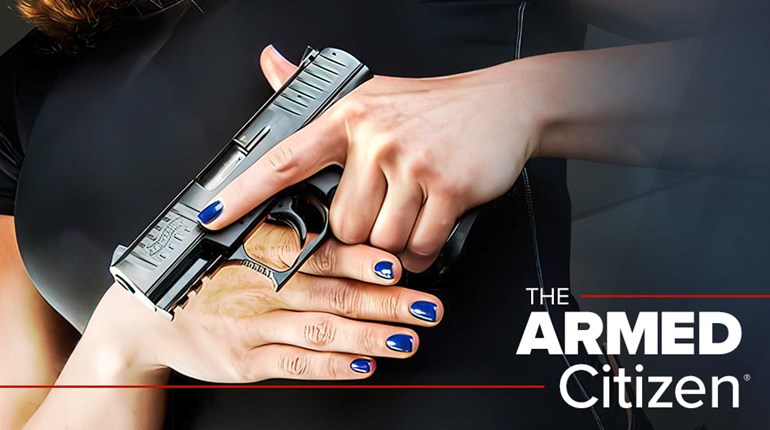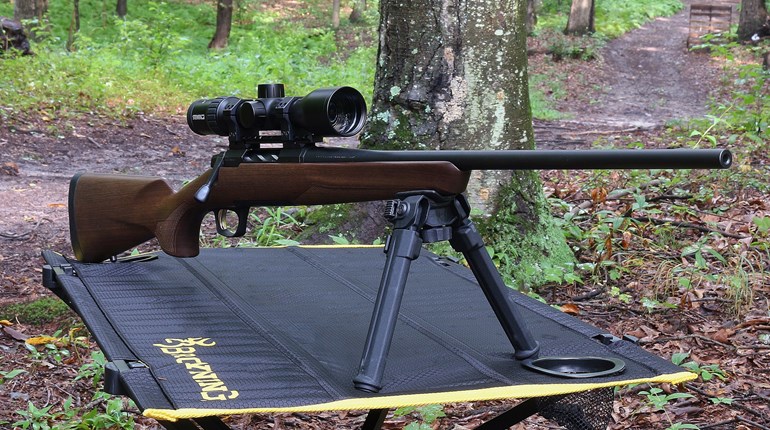
The so-called “mainstream” media likes to spin a scary narrative of lawlessness, even of anarchy, when “permitless carry” (sometimes called “constitutional carry”) is brought before a state legislature. When the media does this, whether through ignorance or bias, they’re simply ignoring the facts. For example, Vermont, which has long had permitless carry, has also long had one of the lowest violent crime rates in the nation.
States, nevertheless, can still be laboratories of democracy—even with politically incorrect gun laws. That is part of what’s going on with permitless carry. As of this writing, states with some legal form of permitless concealed carry include Alaska, Arizona, Kansas, Vermont and Wyoming. This, of course, doesn’t include the 26 states that broadly recognize the right to carry handguns openly (not concealed) without a permit.
Kansas is the newest addition to the list of permitless concealed-carry states. Under an NRA-backed bill signed by Gov. Sam Brownback in early April, Kansans who are at least 21 years old and not prohibited from possessing a firearm under either federal or state law will no longer be prohibited from carrying concealed firearms without a permit. This law doesn’t scrap Kansas’ handgun carry permit system, as residents can still apply for and obtain a permit. Actually, if they plan to travel outside Kansas with a handgun, they still must acquire a permit—without a permit, they won’t be able to legally carry in the many states that have reciprocity agreements with Kansas.
Chris W. Cox, executive director of the NRA’s Institute for Legislative Action (NRA-ILA), spoke highly of the new Kansas law upon the governor’s signing of the bill:
“On behalf of the NRA’s 5 million members, we want to thank Governor Brownback and Senate Majority Leader Terry Bruce for their leadership on this critical issue,” Cox said. “This new law is a common-sense measure that allows law-abiding Kansans to exercise their fundamental right to self-protection in the manner that best suits their needs.”
Keeping The Bureaucracy Honest
In truth, passage of the Kansas law, like in other states, is in essence simply deregulating concealed carry. Cox brings up a central, but often overlooked, part of what’s compelling some to push for such deregulation. The complex web of laws regulating guns in and between the states can be confusing and onerous. Different gun regulations among the states—and even within some states—can be bewildering. Also, navigating sometimes sluggish bureaucracies can be a burden on law-abiding gun owners. These problems are a part of what’s prompting many gun owners to push for permitless carry. When common sense and good laws keep a bureaucracy in check, things can work relatively well. But when behind them is a legislature that sees the citizenry’s right to bear arms as a problem, the bureaucracy can purposely create a gauntlet designed to make getting a permit to carry a concealed handgun all but impossible.
Anyone who has stood in line at a state department of motor vehicles knows that bureaucracies left unchecked can grow into large, often senseless, alternate realities. When common sense and good laws keep a bureaucracy in check, things can work relatively well. But when behind them is a legislature that sees the citizenry’s right to bear arms as a problem, the bureaucracy can purposely create a gauntlet designed to make getting a permit to carry a concealed handgun all but impossible.
It was no small feat of bureaucratic endurance, for example, for me to get my handgun carry permit from New York state’s Dutchess County. The thing that sticks in my mind—I didn’t even mind the trouble of getting four people to use their lunch hours to visit notary publics to sign statements swearing I’m a good citizen—was one simple but very troubling question. I was seated in a metal chair in front of a gray desk in the sheriff’s department’s pistol bureau. My pen dangled over a form that felt more like a final exam.
The question asked how I intended to use a handgun. If I wrote “self-defense” and was later stopped for having a headlight out, and so by law had to declare I carry, would that phrase cover me? If not, did I need to write in every conceivable situation—self-defense, hunting, going to the range—wherein I might carry a handgun? If so, I’d need a lot more paper.
After a minute twisted up in this invasive question, a kind bureaucrat on the other side of the gray desk leaned forward and said, “Just write for all legal purposes.” I smiled and thanked her. After all, “for all legal purposes” is a smart escape from a legalistic trap.
That little snare is nothing compared to the bureaucratic entanglements created in places like the District of Columbia. This, of course, is why your NRA has long been actively lobbying for states to pass “shall-issue” carry laws, so that when a person meets all legal requirements, a state must issue the individual a concealed-carry permit—as opposed to “may-issue,” where a bureaucrat can use his or her own “discretion” to deny someone’s constitutionally protected right to bear arms. These bureaucratic hurdles are also why some prefer permitless carry.
The Underlying Constitutional Struggle
Additionally, some gun owners don’t believe they should have to receive permission from the state to exercise a right that has been specifically protected from government infringement by the U.S. Bill of Rights. This gets us to the basis of our rights, which is a discussion many in the mainstream media would rather not dig into.
As enumerated in the U.S. Bill of Rights, the Second Amendment is what constitutional scholars call a “negative liberty,” or a restriction on government. Like other provisions in the Bill of Rights, it was enacted primarily with the federal government in mind. In the 20th century, however, amendments within the Bill of Rights were construed by the U.S. Supreme Court to also restrict state and local governments (a legal process called “incorporation”). After the U.S. Supreme Court, in District of Columbia v. Heller (2008), ruled that the Second Amendment is indeed an individual right, the high court ruled in McDonald v. Chicago (2010) that the Second Amendment also restricts state and local governments.
By contrast, positive rights, such as those that exist in the European Union, are created by and defined by government. Positive rights are not restrictions on government. Positive rights theoretically empower the government to do as it thinks best with or for us, whereas negative liberties are the people’s way of restricting government power.
Some have argued the requirement of any sort of permitting process and fees as preconditions to lawfully carrying a firearm for self-defense constitutes an unlawful prior restraint. Others are willing to tolerate a fee-based Right-to-Carry permitting regime, so long as permitless open carry remains an option. The issue of charging fees for the permitting process also raises objections by some, especially when those fees exceed the administrative expenses of administering the system.Protecting honest, law-abiding Americans from the predations of criminals and the overreach of unchecked, sometimes hostile bureaucracy is what, at its core, the permitless carry movement is all about.
In this post Heller and McDonald legal world, these are just the beginning of the legal questions now being debated. For now, though, court watchers wait for the U.S. Supreme Court to accept a case that will further define the right to bear arms. The scope of the Second Amendment is still being shaped by the courts.
Yet constitutional rights only provide a “floor” of protection against official transgression. They do not decide the best or optimum level of freedom, nor inhibit legislatures from providing additional legal protections for fundamental liberties. This is why your NRA is so active in both courtrooms and legislatures, and needs your continued support. Generations from now, gun owners will look back at this period as pivotal to their struggle to be free. When they do, they’ll either thank us or condemn us.
That’s a brief explanation of what’s going on in the legal weeds. It’s worth understanding the basis of this debate because a populace that is ignorant of its rights is certain to lose its rights. Thomas Jefferson said this more eloquently in a letter he wrote to Col. Charles Yancey in 1816: “If a nation expects to be ignorant and free in a state of civilization, it expects what never was and never will be.”
Protecting honest, law-abiding Americans from the predations of criminals and the overreach of unchecked, sometimes hostile bureaucracy is what, at its core, the permitless carry movement is all about. And while the NRA wholeheartedly supports permitless carry legislative efforts, it should be noted that many gun owners in states that pass such legislation will still want to be issued permits so they can participate in the reciprocity carry agreements forged between states over the past several years.
The Big Picture: RTC Reciprocity
To bring this struggle against confusing and sometimes burdensome laws into focus, consider another battle the NRA is fully engaged in—the fight for a national Right-to-Carry reciprocity law. There are now more than 12 million Americans who have obtained concealed-carry permits. These citizens have entered into and are required to understand what can be a complex web of laws. In some states, Right-to-Carry permit holders are subject to varying rules as to where, how and what they can carry from one political subdivision to the next. Even after they learn and obey these restrictions on their rights, if they want to travel to another state with their personal-protection gun, they have to consider the laws of other states. This is a very complicated and burdensome process, and it contains many pitfalls even for those who go out of their way to try to learn and obey the law.
Shaneen Allen found this out the hard way. Her case became a wake-up call for many around the country. Allen, a single mother and Right-to-Carry permit holder from Pennsylvania, was arrested in New Jersey for having her handgun in her car. She had been pulled over by a New Jersey police officer for making an unsafe lane change. She then told the officer she had a handgun. The police officer arrested her. She was then shocked to find that a prosecutor wanted to lock her up for years, even though she had no criminal record.
Her case drew more attention when Atlantic County Prosecutor Jim McClain refused to allow her in the pretrial intervention program (PTI), a state process created to keep people like Allen from jail. McClain’s office, however, had used PTI to keep NFL star Ray Rice from jail, even after a video surfaced showing him knocking out his then-fiancée with a punch to the face. Thankfully, the New Jersey Attorney General’s Office responded to the resulting outcry by issuing revised guidelines for determining who qualifies for PTI. Allen was accepted into PTI under the revised guidelines, and Gov. Chris Christie ultimately pardoned her. The laws that ensnared Allen, however, are still on the books in New Jersey.Allen’s case is just one of many such injustices and vividly illustrates why the NRA advocates for a national reciprocity law for Right-to-Carry-permit holders.
Allen’s case is just one of many such injustices and vividly illustrates why the NRA advocates for a national reciprocity law for Right-to-Carry-permit holders. This would allow those with permits to use them for carrying in other states.
At press time, several such bills had been introduced in the U.S. House of Representatives and the U.S. Senate. Those carrying under the authority of this legislation would still be subject to the same rules of behavior the states apply to their own residents who carry. None of the laws provide for a national concealed-carry permit, nor do they dictate how states issue their own permits. They also do not allow a resident to circumvent his or her home state’s Right-to-Carry permit laws; the federal protection only applies when the permit holder travels out of his or her home state.
The issue of Right-to-Carry reciprocity even took a front seat at the recent NRA Annual Meetings & Exhibits in Nashville, Tenn., in April. In fact, NRA Executive Vice President and CEO Wayne LaPierre spoke of the urgency of passing legislation this session during his speech at the Annual Meeting of Members.
“In these dangerous times, no one should be forced to face evil with bare hands,” LaPierre said. “It’s time for national Right-to-Carry [reciprocity] legislation. It’s time for Congress to pass it today.”

|
Use Your Power
To weigh in on this legislation, you can contact your U.S. senators and U.S. representative by phone at (202) 224-3121 or by using the “Write Your Lawmakers” tool at
nraila.org.
|

































